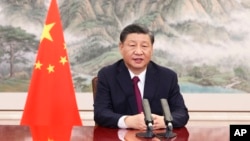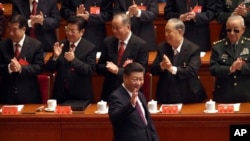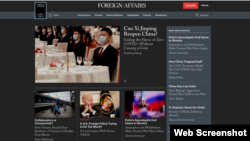A prominent China scholar is castigating mainstream American media for their coverage of the coming Chinese Communist Party Congress, saying they miss the most salient point about China’s governing system when they say President Xi Jinping is seeking an unprecedented third term in office.
In a recently published essay, George Washington University law professor Donald C. Clarke focused his ire on the prestigious Foreign Affairs magazine, which in its September/October 2022 issue refers to Xi as China's president when discussing his defining role in the country's political system.
“The first paragraph states that by doing away with presidential term limits, Xi freed himself to lead China for the rest of his life. This is just wrong,” Clarke wrote. “Xi leads China by virtue of being the general secretary of the party, and there were never any term limits on that position.”
In 2018, China’s National People’s Congress voted with almost no dissent to remove a provision from the nation’s constitution that had limited the presidency to two consecutive five-year terms. It was widely reported at the time that the move cleared the way for Xi to rule China indefinitely.
But Clarke and other scholars make the point that Xi’s real power lies not in his post as president but in his position as general secretary of the Chinese Communist Party. It is to that position that Xi is expected to be reelected for a third term at the party conclave beginning October 16.
There has never been a formal limit on the number of five-year terms that a party general secretary can serve. Previous party leaders, however, have established a precedent of stepping down after two terms.
'Propaganda'
While many international news organizations finesse the matter of Xi’s title by simply referring to him as the Chinese leader, Clarke wrote that Foreign Affairs, “like virtually every other mainstream English-language newspaper and journal,” has “uncritically adopted the practice promoted by the Chinese English-language propaganda apparatus” of calling Xi president.
The scholar suggested that Beijing’s leaders “want China to appear to be a normal country where the person at the top of the state apparatus is the boss. … They would want people to forget that it’s still an old-style Leninist party-state, where even the military — not just in substance but even formally — belongs to and serves the Communist Party, not the state.”
Asked to respond to Clarke’s essay, Foreign Affairs emailed VOA to say: “We appreciate Professor Clarke's close read of Cai Xia's article. Although almost all major English-language publications call Xi Jinping ‘president,’ Clarke was right that the article incorrectly referred to which of Xi's three main positions the National Congress of the Chinese Communist Party has the power to extend: it can grant Xi a third term as party leader, not president.” Xi’s third position is head of the Central Military Commission.
“In the online version of the article," the magazine said, "we noted the error, and we are running a correction in our next print edition, as well.”
Clarke wrote in his essay that he believed the errors occurred in the translating and editing process, not in Cai’s original draft. Cai taught for years at the Chinese Central Party School in Beijing before making a high-profile move to the United States in 2019.
Clarke’s essay is resonating with some other China experts in the United States.
“I just read Don Clarke’s essay and completely agree with him,” said Steven Levine, who has taught Chinese history and politics at the universities of Montana and North Carolina and elsewhere.
“There is no legitimate excuse for the linguistic confusion — whether deliberate, sloppy or ignorant — regarding the titles of the Chinese officials, including Xi Jinping,” he wrote in response to emailed questions from VOA.
“Even a rudimentary knowledge of China acquired in a Chinese politics 101 undergraduate class, such as I taught for many years, would make clear the relative power positions of the state and the party,” he wrote.
'Reality of power'
Addressing Xi by his proper title is essential to clarifying “what the reality of power is in the People’s Republic of China,” Levine said.
Speaking with VOA on Friday, China scholar June Teufel Dreyer, whose textbook China’s Political System: Modernization and Tradition is in its 10th edition, also highlighted the importance of using correct terminology.
“Confucius wrote about the need to 'zheng-ming' — 'rectifying the name' — that’s what is needed here,” she said. “Xi Jinping’s power lies not with the government, but with the party.”
Asked if anything stood out in Clarke’s critique, Dreyer said: “What struck me is the absolute truth in what he was saying.”
Dreyer told VOA of her own experience in getting articles published. “It’s interesting to me that when I referred to Xi as general secretary, sometimes people will say, ‘But he’s president.’ I’m talking about editors here.”
“I have enormous respect for Don Clarke, I always have,” added Dreyer, who teaches at the University of Miami. “I especially applaud him for having the fortitude to write something like this, because it’s not easy to do so.
“He has taken issue with the editors of a particularly prestigious journal.”


